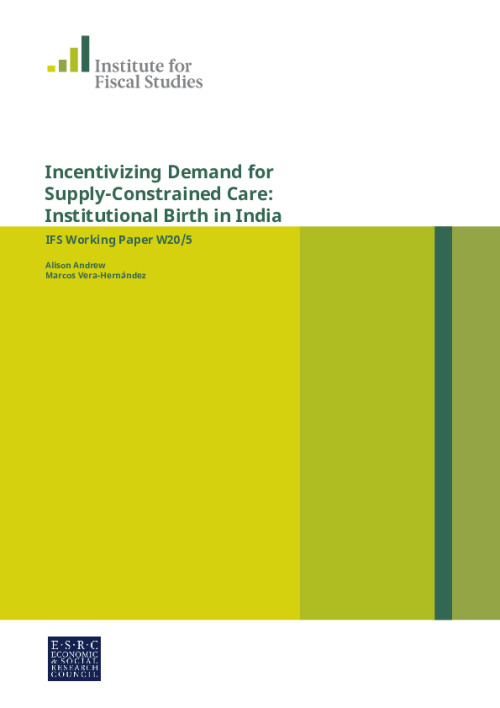Downloads
We examine how the effects of incentivizing individuals to use healthcare depend on the capacity of the health system. We study a conditional cash transfer program (JSY) in India that paid women to give birth in medical facilities. We find that JSY doubled the number of deliveries for which the average facility was responsible. In areas with below-median capacity, JSY increased perinatal mortality. Adverse effects spilled over onto rates of childhood vaccinations suggesting a diversion of resources from routine services. Our results indicate that health-system capacity is of first-order importance in determining whether demand-side policies are beneficial or harmful.
Authors

Research Fellow University College London
Marcos is a Research Fellow at IFS, an Affiliate at the Rural Education Action Program and a Professor of Economics at the University College London.

Research Fellow
Alison is a Senior Research Economist of our Institute with research interests in the economics of gender, marriage and education.
Working Paper details
- DOI
- 10.1920/wp.ifs.2020.520
- Publisher
- The IFS
Suggested citation
Andrew, A and Vera-Hernandez, M. (2020). Incentivizing Demand for Supply-Constrained Care: Institutional Birth in India. London: The IFS. Available at: https://ifs.org.uk/publications/incentivizing-demand-supply-constrained-care-institutional-birth-india (accessed: 2 May 2024).
More from IFS
Understand this issue

If you can’t see it, you can’t be it: role models influence female junior doctors’ choice of medical specialty
24 April 2024

The NHS waiting list: when will it come down?
29 February 2024

Retirement is not always a choice that workers can afford to make
6 November 2023
Policy analysis

Progression of nurses within the NHS
12 April 2024

Regional variation in earnings and the retention of NHS staff in Agenda for Change bands 1 to 4
10 April 2024

4.2 million working-age people now claiming health-related benefits, could rise by 30% by the end of the decade
19 April 2024
Academic research

The consequences of miscarriage on parental investments
22 March 2024

The menopause "penalty"
18 March 2024

A senior doctor like me: Gender match and occupational choice
24 April 2024
